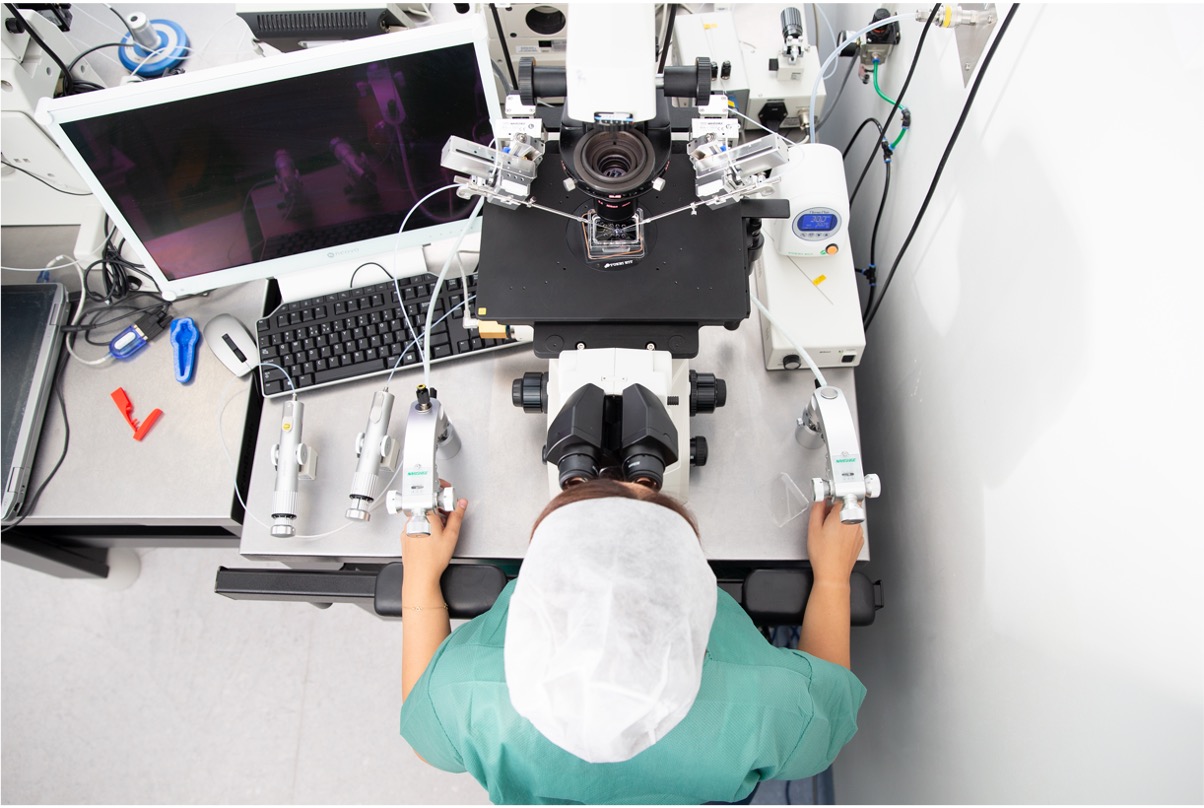Assisted reproductive technology (or ART), such as IVF, has literally offered a lifeline to those who were previously unable to conceive a baby naturally. To date, over eight million babies have been born worldwide as a result of IVF. Deciding to pursue fertility treatment is a very positive step and brings with it a renewed sense of hope and purpose. But regardless of what type of infertility treatment you are undergoing (e.g. a Clomid cycle, IUI, IVF, ICSI, etc), fertility treatment can be a time of high stress and anxiety, and can take an emotional toll on both partners. Not only do women have raging hormones to contend with, but you also have to manage the hopes and fears that come with the process. And by the time patients seek out fertility treatment their emotional reserves may already be very low.
The reality is that fertility treatment is hard. Therefore, it’s extremely important to practise self-care and find support so that you can thrive through this journey.
What makes fertility treatment so difficult?
Infertility treatment is undeniably physically uncomfortable for many people. It can also time-consuming, exhausting, and costly. Factor everything together and you can see the incredible demands placed upon the emotional and physical self. As a result, it’s common for patients to experience some degree of stress, anxiety, and even depression during and after treatment.
- Sense of loss: Many couples who have to undergo fertility treatments report feeling a sense of loss. This could be that you have lost your hopes and dreams for the future, your privacy, your self-esteem, control over your future, and in some cases, the loss of your gene pool.
- Hormone overload: The prescribed hormones, while on one hand are allowing a miracle to take place, can also make everything in life feel much more intense. Don’t doubt for one moment that the hormonal changes some fertility drugs cause really can lead to mood swings. Some women experience few to no reactions, others report feeling very anxious and even depressed. So keep in mind that you may have an emotional reaction to the hormonal changes – and if you do, then this is perfectly normal and fine.
- Mood fluctuations: Fertility treatments can be a time of incredible hope and optimism, as well as distressing pessimism. You may bounce from feeling very hopeful to moments of doom and gloom, tinged with a lot of anxiety in between. Again, this is completely normal. In fact, you might be a saint if you didn’t go through these mood fluctuations.
- New experiences to learn to manage: Fertility treatments bring a lot of new experiences to the table in a quick and compounded period of time. Within a short few days you are going to be taking hormones to increase follicle growth and numbers as well as thicken the lining of your uterus, learning how to inject yourself daily, undergoing ultrasounds and blood tests, coping with invasive monitoring, disruptions to your everyday routine, and more. Think of how the average person handles being bombarded from every angle – now take stock of the fact that you are actually taking on a lot and it’s ok to feel overwhelmed. Give yourself permission to take a break.
- Self-blame: Most people dealing with infertility go through a period of self-blame and question if something they did has caused their inability to conceive naturally. It’s important to accept that the inability to become pregnant is not a reflection of who you are as an individual. And it’s vital for your own wellbeing to accept that there is little a woman can do to influence the outcome following embryo transfer. Whether you become pregnant or not will not be dictated by what you do during the two-week-wait. If you do not receive a positive pregnancy test result, this is not your fault, do not blame yourself. While it is our goal that every fertility treatment results in a positive pregnancy and a healthy baby, this is not always the case. Blaming yourself will only be counterproductive.
- The constant waiting: Never will time go so quickly and so slowly at the same time and it can be very frustrating. Once you start a cycle everything may seem to be happening all at once as there is so much to learn and do. But once you have started the hormone treatments you then have to wait between each appointment to learn how many follicles are growing, are they on track, is your uterus lining thick enough for implantation. Then your partner will need to produce a semen specimen, on demand. Following egg retrieval you have to wait to hear how many were successfully fertilised, are the embryos growing rapidly enough, how many will be strong enough for transfer or freezing. Finally, the mother of all waits comes – the two-week-wait (2ww). Did this cycle work? Am I pregnant? When can I start using home pregnancy tests (at the risk of getting a false result)? Was that twinge a symptom of pregnancy? To say the two-week-wait is hard is an understatement and something few people understand unless they have been through it. For many, it helps to plan how they are going to fill that time, whether it be with work or hobbies or getting out and about.
- Lack of understanding: Many people may not know or understand what you are going through. Often their comments and questions, no matter how well intended, can feel intrusive and insensitive. Choose which family and friends you would like to tell and don’t be afraid to set boundaries. Sharing with others can help to reduce social pressure, gain support and sensitise others to comments that may be upsetting. Once you have shared, you may also find other people might be more forthcoming about their own battle with infertility. In fact, many patients tell us that their family and friends are honoured to be able to support them through this time.
- Financial stress: The financial costs of fertility treatments may also cause you stress since treatments are an unplanned expensive and there will be additional out of pocket expenses after you receive the Medicare rebates.
- Fear of failure: The biggest stress for patients may be the fear of failure – that the cycle will not result in a positive pregnancy. Unfortunately, there are no guarantees with fertility treatment and it may take a few cycles and different treatment protocols in order to achieve pregnancy. Despite knowing this, the disappointment of an unsuccessful cycle can be devastating. We always hope we are the ones that get lucky and fall pregnant on our first cycle.
What can I do to cope with stress during fertility treatment?
- Prepare for the emotional side of fertility treatments: Talking to people who have been through or are undergoing fertility treatments can be very beneficial. Most of all it can show you that you are not alone and help you to navigate the emotional side of the process. Our team at Wesmtead Fertilty Centre are able to offer you emotional support and care, but the understanding and empathy you will receive from others who have been there can make a considerable positive difference to your mental wellbeing. Finding a support network can give you a platform to cry, vent, holler, commiserate, and celebrate – you don’t have to go through this alone. Read about other patient experiences on our website.
- Get help from a fertility therapist or counsellor: At Westmead Fertility Centre we believe so strongly in the therapeutic benefits of speaking to an experienced fertility counsellor that we offer all our patients the opportunity to see our resident counsellor free of charge. A counsellor who is experienced in infertility can help you to navigate your way through the mental and emotional side of the process. Additionally, many of the decisions you will need to make might be complex and hard. Counselling can help both you and your partner to uncover what is important to you, and how to tackle various matters together as a team. Fertility treatments can be stressful on a couple’s relationship. You may have very different coping techniques to one another, or may handle stress in very different ways. Learn how to work together and support one another as early as possible. This is a time to treat each other tenderly.
- Acknowledge yourself: Don’t allow anyone to simplify or underestimate the effects of fertility treatment. The side effects from treatment can really affect your physical, mental, and emotional wellbeing. It’s vital to acknowledge everything you are going through and experiencing. Accept that you are undergoing a time of heightened stress and don’t try to downplay or deny its effects.
- Rest and take care of yourself: Give yourself permission to take frequent breaks and remember to spend time engaging in reenergising activities you enjoy. As explained above, infertility treatments mean a whole set of new additional stresses. For those who have to undergo a number of treatments in order to conceive, months of appointments, hormones and procedures can be draining. It’s important to give yourself both physical and mental breaks.
- Choose the commitments you make wisely: As much as possible only make commitments to activities that will help you to feel happy, revitalised, and supported. It’s perfectly ok to say ‘no’ to obligations that will drain from your energy reserve. For example, attending the baby shower of a barely known colleague might not be beneficial at this time.
- Become informed: For many, becoming informed and learning as much as they can about their situation helps them to regain a sense of control, and allows them to feel empowered and capable of making knowledgeable decisions. There are many sources of information such as books, support groups, online forums and websites, but make sure to always seek the opinion of your fertility specialist.
- Exercise: Exercise is known to be one of the best ways to alleviate stress. Be sure to talk to your fertility specialist first though to make sure your routine is not too vigorous. If you have not been exercising regularly prior to your treatment cycle this may not be the best time to take up a strenuous activity.
- Choose your fertility clinic carefully: Not all fertility clinics are created equal. It’s important to work with a clinic that you feel has your best interests at heart, and that takes the time to ensure you are informed and understand everything that is happening. Ask yourself can you envisage sharing deep physical and emotional experiences, as well as making important decisions with the entire team. This should include everyone from the fertility specialist to the nurses and embryologists. Believing in, liking, and trusting your team will go a long ways towards a less stressful process.
At Westmead Fertility Centre we know and understand how hard fertility treatments can be on both an emotional and physical level. Our staff are here to support you throughout your journey and our patients are welcome to visit out fertility counsellor free of charge.
Infertility treatment is tough and it is normal to struggle at times. Acknowledge how you are feeling and treat yourself with compassion and kindness. And remember, you are not alone!
All content should be considered as opinion only. Always seek the direct advice of your doctor in connection with any questions or issues you may have.




